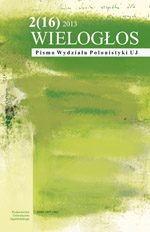Słodko-gorzkie heterotopie. Bruno Schulz i „tekst sanatoryjny” w europejskiej literaturze okresu międzywojennego
Bittersweet heterotopias: Bruno Schulz and the ‘sanatorial text’ in european interwar literature
Author(s): Jens HerlthSubject(s): Literary Texts
Published by: Wydawnictwo Uniwersytetu Jagiellońskiego
Keywords: Schulz Bruno; Mann Thomas; Blecher Max; sanatorium; heterotopia; estrangement
Summary/Abstract: This essay puts forward an idea to read Bruno Schulz’s story „The Sanatorium Under the Sign of the Hourglass” against the background of a specifi c genre in European literature of the interwar period, namely, the ‘sanatorial text’. This term, coined here by analogy to V. Toporov’s ‘Petersburg text’, is based upon the observation that narratives set in sanatoriums share some semantic and structural features; the most important being the heterotopic character of the sanatorial world. According to M. Foucault, a ‘heterotopia’ is a place that ‘represents’, ‘contests’ and ‘inverts’ common places in a society. In M. Proust’s Recherche…, Th. Mann’s Magic Mountain, and M. Blecher’s Scarred Hearts the heteropic setting is used to produce a feeling of estrangement. These novels explore the notions of time and society by constructing a heterotopic counter-world where the ‘ordinary’ stream of events is interrupted and life becomes intensifi ed, it is made palpable again. Schulz’s story points to the deeply problematic consequences of such a renewal of ‘authentic experience’. It shows that a break taken from civilizational habits can unleash barbarism.
Journal: Wielogłos
- Issue Year: 2013
- Issue No: 16
- Page Range: 25-37
- Page Count: 13
- Language: Polish

